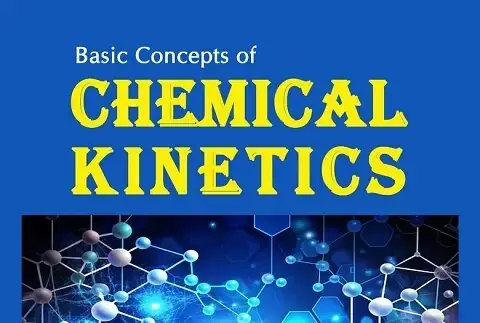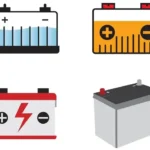A Book Review: Basic Concepts of Chemical Kinetics
Iterative International Publishers (India and USA) has recently published a book. It’s titled “Basic Concepts of Chemical Kinetics.” Are you curious about how chemicals react and change over time? Then “Basic Concepts of Chemical Kinetics” is the perfect book for you! Specifically, three experts wrote this book: Dr. Damodar V Prabhu, Dr. Venkat S Narayan, and Dr. Harichandra A Parbat. Additionally, they explain the main ideas and basics of chemical kinetics in a way that’s easy to understand.
Basics of chemical kinetics
Chemical kinetics is the study of how chemical processes happen. It is important in many different fields. For example, understanding reaction mechanisms explains step-by-step how reactions occur. Catalysis speeds up chemical reactions. Chemical kinetics also helps in the study of natural products, medicine, and drug storage. This knowledge is useful in food preservation and crop protection too.
About the book “Basic Concepts of Chemical Kinetics”
Although, the book “Basic Concepts of Chemical Kinetics” is about studying how chemical reactions happen. Basically, chemical kinetics is an important part of chemistry. It is well-studied around the world. Additionally, learning about basics of chemical kinetics is a key part of chemistry courses everywhere. This book wants to explain the main ideas of chemical kinetics clearly. It also wants to make readers interested in the topic. Additionally, the book will help students, teachers, researchers, and industry chemists. It will be a good first step for anyone wanting to study more about this topic. Students in other countries will also find the book helpful. This is because it matches the Indian universities’ Chemical Kinetics syllabus.
The chapters cover
1) The rate and order of chemical reactions.
2) Theories of reaction rates,
3) Kinetics of reactions in solution,
4) The kinetics of complex reactions,
5) Photochemical reactions,
6) Kinetics of fast reactions,
7) Kinetics of surface reactions,
8) Catalysis and kinetics of catalyzed reactions,
9) Polymerization reaction kinetics.
Read the book to learn the basics of chemical kinetics
Each chapter carefully ends with questions and numerical problems to effectively help you practice. Additionally, it also includes several solved examples, ensuring a thorough understanding of the concepts. The authors strictly follow IUPAC rules for naming, terminology, units, and symbols, maintaining clarity and standardization.
IUPAC stands for the International Union of Pure and Applied Chemistry, which specifically sets guidelines to ensure consistency in chemistry.
Furthermore, the authors thoughtfully provide a list of helpful books so you can learn more about the basics of chemical kinetics.
Basically, chemical kinetics is the study of the rates of chemical reactions, a crucial concept in chemistry. Moreover, you will also find short biographies of the scientists who significantly contributed to the development of this field, offering valuable historical insights.
Additionally, the authors wrote the book after many years of teaching and researching chemical kinetics. They also used their industry experience.
Closing remarks
Overall, “Basic Concepts of Chemical Kinetics” is a fantastic introduction to chemical reactions. Basically, this book is great for budding scientists or anyone who loves learning. It will spark your interest in chemistry. Additionally, you will understand the science behind the reactions you see around you. Grab a copy and start your exciting journey into the world of chemical kinetics today!
About the authors
Dr. Damodar V. Prabhu
Dr. Damodar V. Prabhu received his Ph.D. in Chemistry from the University of Mumbai (earlier called Bombay), Mumbai. Over the years, he has made significant contributions to the field of chemistry. He diligently served as a faculty member of the Chemistry Department at Wilson College, Mumbai, for nearly four decades. Eventually, he took on the role of Head of the Chemistry Department, further enhancing the institution’s academic excellence.
Following this, he was appointed as an Adjunct Professor of Chemistry to actively guide research, allowing him to mentor aspiring scholars. Throughout his career, he has passionately taught both graduate and postgraduate classes, ensuring a strong academic foundation for his students. Additionally, Dr. Prabhu has worked extensively on the kinetics of oxidation of perfumery alcohols and phenols, contributing valuable insights to this specialized field.
Dr. Prabhu also studied how Schiff bases break down through a chemical reaction known as hydrolysis. He examined the speed and stages of this reaction in basics of chemical kinetics book. He also researched how certain catalysts speed up chemical reactions.
These catalysts are made of transition metal ions. Transition metals are elements like iron and copper.
They use their ions, or charged atoms, to help reactions happen faster and more evenly. Additionally, he researched environmental aspects of sewage disposal in metropolitan cities.
He led the Indian Teams as the Delegation Leader in International Chemistry Olympiads in 2001 and 2002. He also mentored the Indian Teams in International Junior Science Olympiads in 2013 and 2016. You can find his ResearchGate profile at researchgate.net/profile/d-prabhu.
Dr. Harichandra A. Parbat
Dr. Harichandra A. Parbat earned his Ph.D. in Chemistry from the University of Mumbai, Mumbai. He studied under the guidance of Dr. Damodar V. Prabhu. Dr. Parbat worked as a faculty member at Wilson College, Mumbai. Now, he is an Associate Professor and the Head of the Chemistry Department there. He is a recognized Ph.D. guide in Chemistry of Mumbai University, Mumbai. He received his B.Sc. Chemistry degree from Shivaji University Kolhapur and M.Sc. (Physical Chemistry) degree from University of Pune. Dr. Parbat is a Resource Person on Quantum Chemistry. Dr. Parbat studies several scientific fields. He is interested in Reaction Kinetics, Nanoparticles, Nanomaterials Synthesis, Electrocatalysis, Catalysis, and Quantum Chemistry. This means he examines how chemical reactions occur and how quickly they happen.
He also creates tiny materials and studies their reactions with electricity or other chemicals in basics of chemical kinetics book.
Dr. Parbat has extensively researched many specific topics, delving into the intricate world of chemistry. He has thoroughly studied how perfumery alcohols and phenols (a type of chemical) react and gradually break down. Additionally, Dr. Parbat meticulously examines how Schiff bases (special compounds) undergo hydrolysis (a reaction with water), providing crucial insights into their behavior.
Furthermore, he actively explores homogeneous catalysis, a process in which a catalyst significantly speeds up a reaction without undergoing any changes itself. In this process, both the catalyst and the reactants remain in the same phase, such as both existing in liquid form. Additionally, he also conducts in-depth studies on photocatalysis, where light plays a crucial role in accelerating chemical reactions.
Dr. Venkat S Narayan
Dr. Venkat S Narayan did his MSc (Tech.) in Plastics Technology from University of Bombay, Mumbai, India. He obtained his PhD in Chemistry from Virginia Tech., Blacksburg, Va., USA. Dr. Venkat has a lot of technical knowledge and practical experience. He works with:
- Creating and studying engineering and high-temperature polymers. Polymers are materials made of long, repeating chains of molecules.
- Making and changing small molecules for leather processing. This means he works on the chemical substances used to treat leather.
- Using heat and UV light in processes for optical, eye-related, and surface coating materials. These processes involve exposing materials to high temperatures or ultraviolet light.
- Designing, developing, studying, and making different kinds of polymer materials for medical devices. He does this work from the research stage to making them commercially available.
Dr. Venkat Narayan holds 12 U.S. patents. He has received several awards. He won the Innotech Presidential Award in 1995. In 2013, he received the Johnson Medal for Excellence in Science.
To stay updated with the latest developments in STEM research, visit ENTECH Online. This is our digital magazine for science, technology, engineering, and mathematics.
At ENTECH Online, you’ll find a wealth of information. We offer insights and resources to fuel your curiosity. Our goal is to inspire your passion for new scientific discoveries.






